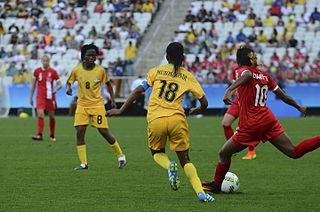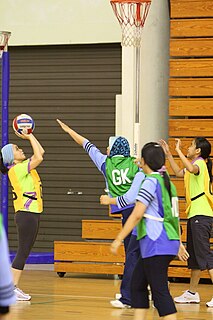Related Research Articles

Netball is a ball sport played by two teams of seven players. Netball is most popular in many Commonwealth nations, specifically in schools, and is predominantly played by women. According to the INF, netball is played by more than 20 million people in more than 80 countries. Major domestic leagues in the sport include the Netball Superleague in Great Britain, Suncorp Super Netball in Australia and the ANZ Premiership in New Zealand. Four major competitions take place internationally: the quadrennial World Netball Championships, the Commonwealth Games, and the yearly Quad Series and Fast5 Series. In 1995, netball became an International Olympic Committee recognised sport, but it has not been played at the Olympics.

The International Netball Federation (INF), formerly the "International Federation of Netball Associations" (IFNA), is the worldwide governing body for Netball. The INF was created in 1960 and is responsible for world rankings, maintaining the rules for netball and organising the Netball World Cup.

Netball is the most popular women's team participation sport in Australia. In 1985, there were 347,000 players. In 1995, there were over 360,000 Australian netball players. Throughout most of Australia's netball history, the game has largely been a participation sport; it has not managed to become a large spectator sport. In 2005 and 2006, 56,100 Australians attended one to two netball matches. Of these, 41,600 were women. 46,200 attended three to five netball matches, with 34,400 of those spectators being women. 86,400 attended six or more netball matches, with 54,800 spectators being female. Overall, 188,800 people attended netball matches, with 130,800 being female. In 2005 and 2006, netball was the 10th most popular spectator sport for women with Australian rules football (1,011,300), horse racing (912,200), rugby league (542,600), motor sports (462,100), rugby union (232,400), football (212,200), harness racing (190,500), cricket (183,200) and tennis (163,500) all being more popular. The country set an attendance record for a netball match with a record crowd of 14,339 at the Australia–New Zealand Netball Test held at the Sydney Super Dome game in 2004.

Sport in Zimbabwe has a long tradition and has produced many world recognized sports names and personalities. Football is the most popular sport, although rugby union, cricket and netball also have a following, traditionally among the white minority. Field hockey is also played widely. Although Zimbabwe has produced many athletes that have competed for Zimbabwe, there are also many athletes who learned their sport in Zimbabwe, but have chosen to represent other countries.

The history of netball can be traced to the early development of netball. A year after basketball was invented in 1891, the sport was modified for women to accommodate social conventions regarding their participation in sport, giving rise to women's basketball. Variations of women's basketball arose across the United States and in England. At the Bergman Österberg physical training college in Dartford, England, the rules of women's basketball were modified over several years to form an entirely new sport: "net ball". The first codified rules of netball were published at the start of the twentieth century, and from there the new sport spread throughout the British Empire It was also invented for young females to be energetic.

Sport in Sri Lanka is a significant part of Sri Lankan culture. Although the Sports Ministry named volleyball the national sport, the most popular sport is Cricket. Rugby union is also popular. Other popular sports are water sports, badminton, athletics, football, basketball and tennis. Sri Lanka's schools and colleges regularly organize sports and athletics teams, competing on provincial and national levels.

The Cook Islands compete as a part of netball's Oceania region. More than 1,000 players have registered to play the sport. Participation in the game grew during the 1970s. Much of this is possible because of the national governing organisation, the Cook Islands Netball Association which is a member of Oceania Netball Federation. Because of the level of organisation and the game's development, the country has participated at several international events including the Pacific Games, the Commonwealth Games, the World Games, the Oceania Netball Tournament, the World Youth Netball Championship, and the International Challenge Men's and Mixed Netball Tournament. A demonstration of the Cook Islands success can be found by looking at the national team: It is one of the top ranked in the world.

Netball in Fiji is a popular sport, with a men's and a women's national team. Netball games are most often played by girls on Saturdays during the winter, though games can be played at all times of the year. Women's participation in netball is comparable to men's participation in rugby.
Papua New Guinea Netball Federation was created in the 1960s. There are over 10,000 registered netball players in the country. A large support base for the sport exists around Port Moresby.

Netball is one of the most popular women's participation sports in South Africa. The sport is also played by a large number of men. It exists in a culture where sport plays an important public and social part of life. The history of South Africa's netball involvement mirrors that of other sports played in the country like rugby union. During the apartheid era, there were many netball facilities available for whites to use, and fewer for people from other race groups. Funding issues and gender issues did not help bridge this gap.
Lesotho has a national netball league, and has participated in as well as hosted several netball tournaments. The national league has some sponsors and the national team has been internationally ranked.
Netball has never been played at the Summer Olympics, but its federation has been recognized by the International Olympic Committee (IOC), since 1995 after a twenty-year period of lobbying. The netball community sees netball's absence at the Olympic Games as a hindrance to the global growth of the game, depriving it of media attention and funding. The IOC requires a high geographical scope for inclusion in the Olympics, but netball is mostly played in Commonwealth countries. When the IOC recognized netball's federation, it opened up sources of funds that the global netball community had not been able to access before, including the (IOC), national Olympic committees and sports organisations, and state and federal governments.
The INF's Americas region includes North America, South America, Central America and the Caribbean. The region covers 54 nations, of which 13 have national governing bodies. Each year, the region hosts two tournaments: the CNA U16 Championship and the AFNA Senior Championship. Netball is most popular in Commonwealth countries, such as Antigua and Barbuda and Grenada. As of August 2016, several teams in the region ranked amongst the top thirty-five in the world, including Jamaica (4th), Trinidad & Tobago (9th) Barbados (13th), Canada (18th), Grenada (22nd), Saint Lucia (24th), the United States of America (28th) and Argentina (35th).

Netball is a popular women's sport in parts of Africa. Several African nations are ranked amongst the top thirty in the world. As of August 2016, South Africa was ranked number Five, Malawi was ranked number Six, Uganda was ranked Seven, Zambia was ranked Sixteenth, Botswana was ranked twentieth, Zimbabwe was ranked Twenty-first and Swaziland was ranked Thirtieth in the world.

Netball is popular in several parts of Asia. The IFNA Asia region includes countries such as Australia, India, Malaysia, Singapore and Sri Lanka. The major regional competition is the Asian Netball Championship. In 1994, the first Asian Youth Championship was held in Hong Kong.

Netball is a popular participant sport in some parts of the world, particularly in countries of the Commonwealth of Nations. According to the IFNA, over 20 million people play netball in more than 72 countries. IFNA member nations are divided into five regional groups: Africa, America, Asia, Europe and Oceania.
The Lesotho women's national football team is the national team of Lesotho and is controlled by the Lesotho Football Association.
Netball in Kenya is primarily played by girls. The Kenya Netball Association changed its name to its current one in 1966, and became the first African nation to join the International Federation of Netball Associations. Club netball is played in the country. The national team has qualified for the Commonwealth Games.
ABSA Women's League is the top tier South African association football league.

Malawi (MAW) has competed in the African Games since the second Games in 1973. Athletes from Malawi have won a total of five medals in three Games, first winning in 1987. While competing, two athletes have also broken the national record in 800 metres, firstly in the men's event in 1987 and then in the women's in 2003.
References
- ↑ Shehu 2010 , p. 5
- ↑ Shehu 2010 , p. 6
- ↑ Jimoh Shehu (30 August 2010). Gender, Sport, and Development in Africa: Cross-cultural Perspectives on Patterns of Representations and Marginalization. African Books Collective. p. 6. ISBN 978-2-86978-306-5 . Retrieved 1 November 2012.
- ↑ Munyaradzi Mawere (17 September 2008). The Struggle of African Indigenous Knowledge Systems in an Age of Globalization: A Case for Children's Traditional Games in S. African Books Collective. p. 11. ISBN 978-9956-727-11-7 . Retrieved 1 November 2012.
- ↑ Patrice Delchambre (2010). Zimbabwe, a Passion Shared. Boekenplan. p. 91. ISBN 978-90-8666-151-0 . Retrieved 1 November 2012.
- ↑ Nicola Ansell (31 May 2005). Children, Youth and Development. Psychology Press. p. 73. ISBN 978-0-415-28769-2 . Retrieved 1 November 2012.
- ↑ The W.K. Kellogg Foundation's Orphans and Vulnerable Children Project: Interventions in Botswana, South Africa and Zimbabwe. HSRC Press. 2006. p. 31. ISBN 978-0-7969-2140-6 . Retrieved 1 November 2012.
- ↑ All England Netball Association 1976 , p. 17
- ↑ John Nauright (6 April 2012). Sports around the World. ABC-CLIO. pp. 139–. ISBN 978-1-59884-301-9 . Retrieved 1 November 2012.
- ↑ James Minahan (1 December 2009). The Complete Guide to National Symbols and Emblems: Volume 2. Greenwood Press. ISBN 978-0-313-34500-5 . Retrieved 1 November 2012.
Bibliography
- All England Netball Association (1976). Golden jubilee : 1926 - 1976. All England Netball Association. OCLC 39500756.
- Daimon, Anusa (2010). "Exploring the Interface between Soccer, Gender and Violence in Zimbabwe". In Shehu, Jimoh (ed.). Gender, sport, and development in Africa : cross-cultural perspectives on patterns of representations and marginalization. Codesria. pp. 109–124. OCLC 656503228.